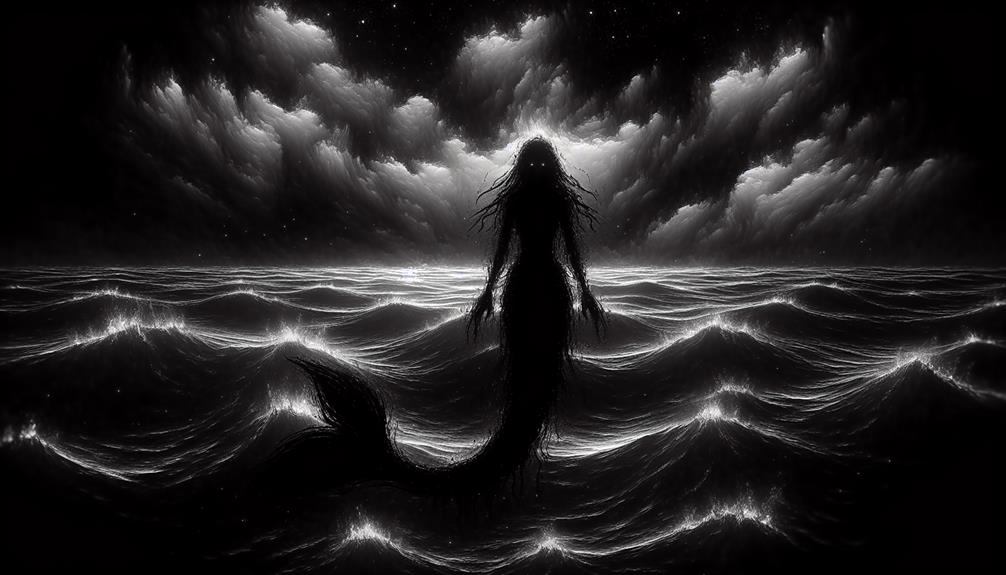You've probably heard the saying 'curiosity killed the cat,' but have you ever considered the potential dangers of encountering a mermaid? Throughout history, folklore and tales have depicted mermaids as both enchanting and perilous creatures.
From ancient myths to modern accounts, the question of whether mermaids pose a threat remains a subject of intrigue and concern. But before you dismiss the idea as mere fantasy, there are compelling reasons to explore the potential dangers associated with these elusive beings.
The Mythological Origins of Mermaids
The mythological origins of mermaids have been widely explored and debated throughout history, with various cultures offering unique interpretations of these enigmatic creatures. The concept of mermaids has its origins in ancient folklore, with the earliest known stories coming from Assyria around 1000 BC. These early tales depicted half-human, half-fish beings, often with seductive powers. The folklore of mermaids spread to other cultures, including ancient Greece, where they were associated with the sea goddess, Atargatis.
Historical sightings of mermaids have been reported by sailors and coastal residents for centuries. Many of these accounts were likely based on manatees, dugongs, or other marine animals, which were misunderstood or embellished in the retelling. One famous example is the Fiji mermaid, a popular sideshow attraction in the 19th century, which was later revealed to be a hoax created using the torso of a monkey and the tail of a fish.
The cultural impact of mermaids is evident in art, literature, and popular culture. From Hans Christian Andersen's 'The Little Mermaid' to contemporary films and television shows, mermaids continue to captivate the human imagination. They've been romanticized as beautiful and alluring creatures, as well as feared for their potential to lure sailors to their doom. The enduring fascination with mermaids speaks to their enduring place in global mythology and storytelling.
Encounters With Mermaids Throughout History
Throughout history, sailors and explorers have purportedly documented encounters with mermaids, often describing them as beguiling and mysterious aquatic beings. Sightings of mermaids date back to ancient times, with reports from various cultures such as the Greeks, Romans, and Near Eastern civilizations. These early accounts typically portrayed mermaids as captivating yet perilous creatures, capable of luring sailors to their demise with their enchanting songs and appearances.
Folklore interpretations of mermaid encounters often varied depending on the cultural context. In some traditions, mermaids were seen as omens of disaster, foretelling shipwrecks and storms. Conversely, other cultures believed that encountering a mermaid was a sign of good luck and protection at sea. These divergent interpretations highlight the enduring fascination and fear that mermaids have evoked throughout history.
During the Age of Exploration, reports of mermaid sightings became more frequent as European sailors ventured into uncharted waters. Notable explorers such as Christopher Columbus and Henry Hudson documented their supposed encounters with these aquatic beings, adding to the mystique surrounding mermaids. However, many of these accounts have been subject to skepticism and are often attributed to misidentifications of manatees, dugongs, or other marine creatures.
Frequently Asked Questions
Are Mermaids Real Creatures That Exist in the Ocean Today?
Yes, mermaids are real creatures that exist in the ocean today. Mermaid folklore and aquatic myths have sparked mermaid sightings throughout history.
Marine biology research hasn't discovered evidence of mermaids as mythical half-human, half-fish beings. However, some speculate that mermaid sightings could be attributed to manatees or dugongs, marine mammals mistaken for mermaids due to their human-like characteristics.
Do Mermaids Have Special Powers or Abilities?
Mermaids, mythical beings of folklore, are often depicted as having supernatural abilities in legends. According to various stories, they're said to possess the power of hypnotic persuasion and the ability to control the elements of nature. These attributes have contributed to the perception of mermaids as enchanting and mysterious creatures.
However, from a scientific standpoint, the existence of such powers remains unverified.
What Do Mermaids Eat and How Do They Survive in the Ocean?
To survive in the ocean, mermaids have adapted to a diet of seafood, such as fish, seaweed, and crustaceans, which provides them with essential nutrients and energy.
Their ocean survival techniques include their ability to hold their breath for long periods, swim gracefully, and navigate the depths with ease.
These adaptations allow mermaids to thrive in their aquatic environment, making them well-equipped for life beneath the waves.
Can Mermaids Communicate With Humans or Other Sea Creatures?
Mermaids have been part of mythical folklore legends for centuries. In these stories, they're often depicted as being able to communicate with both humans and other sea creatures. While there's no scientific evidence to support the existence of mermaids, the idea of underwater communication with these creatures has captured the imagination of many.
Human interaction with mermaids is a popular theme in folklore and fiction, often portraying them as enchanting and mysterious beings.
Are There Any Scientific Studies or Evidence to Support the Existence of Mermaids?
There have been numerous scientific studies conducted to search for evidence supporting the existence of mermaids. However, no conclusive evidence has been found to prove their existence.
Despite myths and legends, the scientific community hasn't been able to validate the existence of mermaids through empirical evidence. While folklore and stories continue to captivate imaginations, scientific research has yet to provide solid proof of the existence of mermaids.
Conclusion
In conclusion, while some may view mermaids as potentially dangerous mythical creatures, it's important to approach the topic with a rational and analytical mindset. By examining the mythological origins and historical encounters with mermaids, it becomes evident that the perception of their danger may be exaggerated.
It's more accurate to consider mermaids as enigmatic beings with a rich cultural significance, rather than inherently perilous entities.

